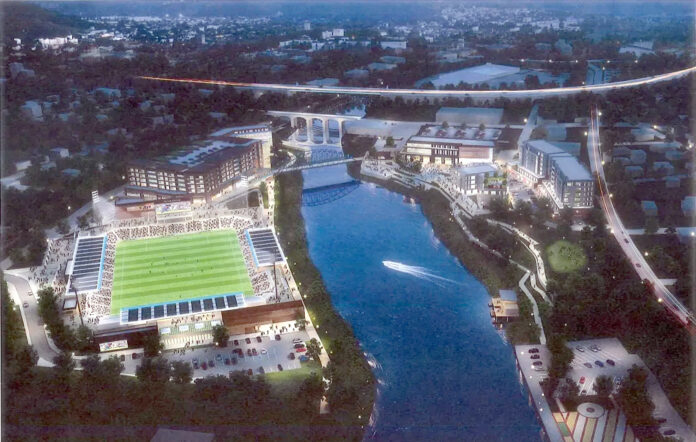
PAWTUCKET – With a timeout called on the central part of the funding for the Tidewater Landing project, supporters and detractors of the 10,500-seat United Soccer League stadium development remain on opposite sides regarding how this could affect the project’s future.
City officials confirmed on Thursday that the issuance of $27 million in public bonds for the soccer stadium construction, a cornerstone of the financing plan, was delayed, citing economic uncertainty from rising inflation and a potential banking crisis. This comes after the project broke ground in August and construction began in November.
Gary Sasse, who has served as Rhode Island’s director of administration and director of revenue under former Gov. Donald L. Carcieri, as well as executive director of the R.I. Public Expenditure Council, believes the state should now rethink its commitment. Sasse said Friday that he has called the soccer stadium “a questionable investment from day one,” well before rising interest rates, inflation and supply chain challenges.
“It is not financially prudent to proceed with public investments in the near future given the current and projected market conditions,” he said. “To do so would be a riverboat gamble with taxpayer dollars.”
However, R.I. Commerce Corp. board member Karl Wadensten on Thursday cautioned against jumping to conclusions, arguing that Pawtucket’s borrowing and the state’s incentives are only “backstops” and one piece of a larger financing puzzle.
Noting the $23 million that the developer Fortuitous Partners has already invested in the Tidewater project, Wadensten, CEO and president of Rhode Island-based VIBCO Inc., said that more investors should be eager to contribute given the public sector support. But the developers and state officials may need to get more creative in the current climate.
“Everybody is dealing with the same headwinds. Many of these [similar] projects are going down across the country,” Wadensten said. “Everybody is cautious now. We are all pulling in our horns a little bit.”
Fortuitous Partners on Thursday insisted the project is moving forward and that Rhode Island FC will take the field in 2024.
“We have invested over $23 million of private capital into initial developments before any public funds have been made available,” said Fortuitous Partners spokesperson Mike Raia. “Like other developers across the world, we are managing through a global banking crisis and hope to close on final financing in the near future.”
Fortuitous has had to amend its request for public dollars as costs have steadily risen. Total costs for the stadium portion currently stand at $124 million, a 50% jump from initial estimates.
The deal involved R.I. Commerce Corp.’s approval for a tax increment financing district to offset development costs, with a public incentive package including $36 million in public borrowing, $14 million in state tax credits and $10 million from the city. The developers promise residential, retail, office, and public infrastructure as part of the plan, with total costs estimates now approaching $400 million.
Matt Sheaff, spokesperson for Gov. Daniel J. McKee, reiterated the “important taxpayer protections on Thursday, including that no state funding will go to the project until it reaches a certificate of occupancy.”
“The administration’s top priority is protecting taxpayers while at the same time providing much-needed economic revitalization to downtown Pawtucket,” Sheaff said.
McKee, who has remained supportive of the deal, cast the tie-breaking vote as Commerce Corp. board chairman in July that approved the financing package.
Sheaff acknowledged “market challenges impacting projects across the nation,” but said the administration “continues to meet regularly with the city and the developer to continue advancing this project and navigate those challenges.”
Wadensten said after the soccer stadium is complete in phase one of the project, the second phase is “where capital growth and investment” comes in.
“But you can’t just stop,” he added.
Public meeting records show the Pawtucket Redevelopment Agency held a closed executive session during its Jan. 31 meeting under a Tidewater agenda item “regarding the investment of public funds.”
Grace Voll, spokesperson for Pawtucket Mayor Donald R. Grebien, said Grebien’s administration is moving forward as planned, citing the “strong partnership between the city, state and developer.”
“The city’s top priority has always been protecting taxpayers. Given the market challenges of the last year, including a global pandemic, rising interest rates, tighter market conditions, and a looming banking crisis, the state financing and private debt components of the capital stack have not made fiscal sense to close on to the date,” she said. “While these challenges exist, we continue to work through these issues as partners… [and the] development teams continue to meet regularly on this important project.”
Voll said plans to close the public and private financing at the same time remain unchanged. “The work continues at the developer’s risk,” she said. “Which we believe shows not only their commitment but their confidence in the project.”
Asked if there are creative solutions in this situation, Wadensten said project stakeholders should consider talks with U.S. Commerce Secretary Gina M. Raimondo, the former governor, to “see what they can tap into in Washington,” such as the Bipartisan Infrastructure Law.
Wadensten also expressed confidence in Dimeo Construction Co., the firm tasked with building the stadium.
“The mayor and governor have done their public duty. Now it’s up to the rest of the teams to make it happen. You can’t listen to the cynics and skeptics now,” he said. “Once you reach that critical mass, you will start to see more investors come off the sidelines.”
Christopher Allen is a PBN staff writer. You may contact him at Allen@PBN.com













Like I’ve said all along, this is just another 38 Studios fiasco. Thank you, Stefan Pryor and Dan McKee.